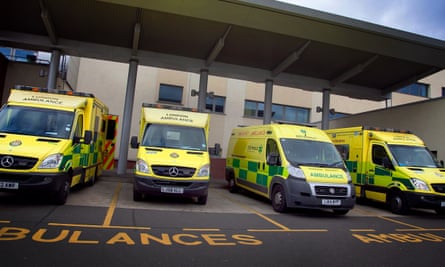Seriously sick children are having to be transported long distances to receive intensive care this weekend because of a lack of beds in major cities.
In England, 85% of beds available in paediatric intensive care units were full on Friday night. But some units in cities including London and Leicester have been forced to declare themselves as “at capacity”. Planned operations are, in some cases, being delayed to prepare for any possible emergencies, as the system shows signs of serious strain as winter starts to bite.
The director of communications at NHS England, Simon Enright, tweeted: “It is true that the NHS is very busy at the moment – record demand.”
It has long been feared that this winter would expose the frailties of the health service. Last month, the cross-party health select committee, chaired by Tory MP Sarah Wollaston reported widespread concerns among medics at the beginning of December because they had already been struggling to deal with the level of demand.
As part of the NHS’s contingency preparations, every hospital trust was ordered to draw up plans to cope, with new “A&E delivery boards” to be set up. Thousands of non-emergency operations and appointments in the run-up to Christmas have been cancelled to enable doctors to concentrate on discharging patients who can safely be sent home, in an effort to free up beds. Official figures show 6,000 more A&E attendances daily compared with six years ago.
Yet last week it emerged that ambulance response times were declining in England, Scotland and Northern Ireland, and last night senior doctors said the problems in paediatrics were a sign of systemic problems.

Dr Damian Roland, a consultant in paediatrics at University Hospitals of Leicester NHS trust, said that his unit was full on Saturday morning, and expressed his frustration at the lack of resources, although he appealed to parents not to panic. Roland, speaking as a senior member of the Royal College of Paediatrics and Child Health, said: “The hospital is at capacity but we are always able to make provision for the patients that need care.
“We know that at this time of the year children will develop viral or other serious illnesses that cause them to need intensive care. There is some frustration though that the system as a whole doesn’t always have the ability to deal with these predictable issues. This is another symptom of the challenge we are facing in operating a sustainable health system that continues to provide the care that patients expect. All of us in paediatrics and child health would like an honest discussion about how the system is funded,” Dr Roland added.
In London, all 90 of the beds available in the seven hospitals that provide paediatric intensive care are occupied. Three children had to be taken out of the capital for treatment because there were no beds available.
An email to units from Will Huxter, NHS regional director of specialised commissioning (London), said: “The demand for emergency beds over the last week has been increasing ... There have been periods where there have been no beds available ... I am therefore asking you to review the requirement to proceed with non-urgent elective operating lists.”
An NHS England spokesman said: “Record numbers of patients are successfully being looked after by the NHS. On any objective measure, despite these pressures, the quality of care is better than it has ever been – whether that’s cancer services, stroke survival, heart attack care or any other major condition.” A national review of paediatric intensive care is currently under way.

Comments (…)
Sign in or create your Guardian account to join the discussion